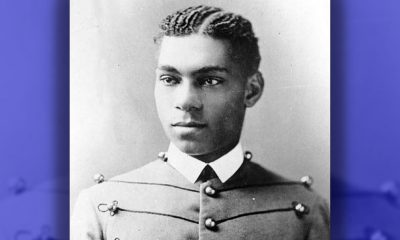Business
The Biz Beat: San Jose Shop Hoists Pinatas to an Art Form
There are few things as joyful as a pinata, and Dulceria Mi Carnaval in San Jose can design them to resemble anything that makes you happy. In a small room adjacent to their shop on East Santa Clara Street, Jose Velasquez and his wife, Cynthia, are surrounded by shelves filled with cardboard templates where the couple has been handcrafting about 15 to 20 pinatas a week since they bought the business in 1991.

By Robert Eliason
San Jose Spotlight
There are few things as joyful as a pinata, and Dulceria Mi Carnaval in San Jose can design them to resemble anything that makes you happy.
In a small room adjacent to their shop on East Santa Clara Street, Jose Velasquez and his wife, Cynthia, are surrounded by shelves filled with cardboard templates where the couple has been handcrafting about 15 to 20 pinatas a week since they bought the business in 1991.
“My sister-in-law started it in 1986,” Cynthia told San Jose Spotlight. “Jose had just gotten out of the army when she decided to sell it, and he decided, ‘Well, I’ll try it out.’ We started making custom pinatas because people were always asking for something we did not have in stock. It was a natural part of what we were doing.”
Jose said people send him photos of what they want. He figures out how to create it.
“I love making them and get really excited when it’s really hard to figure out, like this one,” he told San Jose Spotlight, referring to a four-foot-tall pinata of a margarita glass, rescaling it based on a customer’s tiny cell phone photo.
Looking at the shop’s calendar offers a glimpse at the couple’s creative range: a four-foot-tall cow, an alebrije from the film “Coco,” a 30-inch long crayon, Lightning McQueen, a bee hive, a strawberry, a campfire and a troll head are among the completed or pending tasks for the month.
The couple also makes more substantial pinatas designed for display rather than destruction, including for customers such as the San Jose Earthquakes and the San Francisco Art Institute.
After Jose adds the final details to the framework, the pinata goes to Cynthia for dressing and decorating. Rather than looking like something made to be broken, it’s remarkably solid. Cynthia said customers don’t want them to break easily–they want the pinata to last.
“I’ve had kids scream because they are so happy and excited with the pinata they choose,” she said. “And the parent will come back sometimes and buy another one because their child does not want to break it, so they can have one to hang up in their room or the garage.”
Customer Adam Lopez is only slightly taller than the John Cena-wrestling-themed, star-shaped pinata he chose for his sixth birthday.
“We come here because of the huge variety of themes for all age groups,” said Eduardo Lopez, Adam’s father. “For me, pinatas are a way to celebrate kids and bring the family together.”
Indeed, Cynthia’s favorite pinata to make is a simple design: the number one.
“Customers are so excited to celebrate their child’s first birthday,” she said. “We do them in many different styles. It’s fun to do their first pinata and then watch them come back every year for their next birthday.”
Growing up in Tijuana, Jose remembers having only one pinata as a child: a scarecrow his mother made for his sixth birthday. He said she was overwhelmed by all the kids who showed up from all over the neighborhood–kids he didn’t even know.
“Everyone was very poor, and kids came from all of the houses around us just to line up to try to break it,” Jose said. “It was a big thing.”
Jose said when he makes pinatas, he thinks about the children who are going to having that same kind of experience he had.
“That makes me feel good,” he said. “And I’m happy their parents are getting them a really nice pinata, not some little thing from a supermarket.”
Once a pinata is finished, customers can take them as-is–or they can fill them at the shop from the wide variety of candies imported from Mexico. Dulceria Mi Carnaval also stocks balloons, noisemakers, toys and other party goods. But whether for use or display, the pinatas contain the love and good wishes of the couple who makes them.
“Sometimes I think, ‘Well, I worked on that for so long, and they’re just going to hit it and break it,'” Cynthia said. “But we know the excitement it brings them, a memory that will last a lifetime. We have the photos we take of our work. So, you know, I think we’re okay with it.”
Copyright © 2023 Bay City News, Inc. All rights reserved. Republication, rebroadcast or redistribution without the express written consent of Bay City News, Inc. is prohibited. Bay City News is a 24/7 news service covering the greater Bay Area.
Activism
Oakland Post: Week of April 24 – 30, 2024
The printed Weekly Edition of the Oakland Post: Week of April 24 – 30, 2024

To enlarge your view of this issue, use the slider, magnifying glass icon or full page icon in the lower right corner of the browser window. ![]()
Bay Area
State Controller Malia Cohen Keynote Speaker at S.F. Wealth Conference
California State Controller Malia Cohen delivered the keynote speech to over 50 business women at the Black Wealth Brunch held on March 28 at the War Memorial and Performing Arts Center at 301 Van Ness Ave. in San Francisco. The Enterprising Women Networking SF Chapter of the American Business Women’s Association (ABWA) hosted the Green Room event to launch its platform designed to close the racial wealth gap in Black and Brown communities.

By Carla Thomas
California State Controller Malia Cohen delivered the keynote speech to over 50 business women at the Black Wealth Brunch held on March 28 at the War Memorial and Performing Arts Center at 301 Van Ness Ave. in San Francisco.
The Enterprising Women Networking SF Chapter of the American Business Women’s Association (ABWA) hosted the Green Room event to launch its platform designed to close the racial wealth gap in Black and Brown communities.
“Our goal is to educate Black and Brown families in the masses about financial wellness, wealth building, and how to protect and preserve wealth,” said ABWA San Francisco Chapter President LaRonda Smith.
ABWA’s mission is to bring together businesswomen of diverse occupations and provide opportunities for them to help themselves and others grow personally and professionally through leadership, education, networking support, and national recognition.
“This day is about recognizing influential women, hearing from an accomplished woman as our keynote speaker and allowing women to come together as powerful people,” said ABWA SF Chapter Vice President Velma Landers.
More than 60 attendees dined on the culinary delights of Chef Sharon Lee of The Spot catering, which included a full soul food brunch of skewered shrimp, chicken, blackened salmon, and mac and cheese.
Cohen discussed the many economic disparities women and people of color face. From pay equity to financial literacy, Cohen shared not only statistics, but was excited about a new solution in motion which entailed partnering with Californians for Financial Education.
“I want everyone to reach their full potential,” she said. “Just a few weeks ago in Sacramento, I partnered with an organization, Californians for Financial Education.
“We gathered 990 signatures and submitted it to the [California] Secretary of State to get an initiative on the ballot that guarantees personal finance courses for every public school kid in the state of California.
“Every California student deserves an equal opportunity to learn about filing taxes, interest rates, budgets, and understanding the impact of credit scores. The way we begin to do that is to teach it,” Cohen said.
By equipping students with information, Cohen hopes to close the financial wealth gap, and give everyone an opportunity to reach their full financial potential. “They have to first be equipped with the information and education is the key. Then all we need are opportunities to step into spaces and places of power.”
Cohen went on to share that in her own upbringing, she was not guided on financial principles that could jump start her finances. “Communities of color don’t have the same information and I don’t know about you, but I did not grow up listening to my parents discussing their assets, their investments, and diversifying their portfolio. This is the kind of nomenclature and language we are trying to introduce to our future generations so we can pivot from a life of poverty so we can pivot away and never return to poverty.”
Cohen urged audience members to pass the initiative on the November 2024 ballot.
“When we come together as women, uplift women, and support women, we all win. By networking and learning together, we can continue to build generational wealth,” said Landers. “Passing a powerful initiative will ensure the next generation of California students will be empowered to make more informed financial decisions, decisions that will last them a lifetime.”
Business
Black Business Summit Focuses on Equity, Access and Data
The California African American Chamber of Commerce hosted its second annual “State of the California African American Economy Summit,” with the aim of bolstering Black economic influence through education and fellowship. Held Jan. 24 to Jan. 25 at the Westin Los Angeles Airport Hotel, the convention brought together some of the most influential Black business leaders, policy makers and economic thinkers in the state. The discussions focused on a wide range of economic topics pertinent to California’s African American business community, including policy, government contracts, and equity, and more.

By Solomon O. Smith, California Black Media
The California African American Chamber of Commerce hosted its second annual “State of the California African American Economy Summit,” with the aim of bolstering Black economic influence through education and fellowship.
Held Jan. 24 to Jan. 25 at the Westin Los Angeles Airport Hotel, the convention brought together some of the most influential Black business leaders, policy makers and economic thinkers in the state. The discussions focused on a wide range of economic topics pertinent to California’s African American business community, including policy, government contracts, and equity, and more.
Toks Omishakin, Secretary of the California State Transportation Agency (CALSTA) was a guest at the event. He told attendees about his department’s efforts to increase access for Black business owners.
“One thing I’m taking away from this for sure is we’re going to have to do a better job of connecting through your chambers of all these opportunities of billions of dollars that are coming down the pike. I’m honestly disappointed that people don’t know, so we’ll do better,” said Omishakin.
Lueathel Seawood, the president of the African American Chamber of Commerce of San Joaquin County, expressed frustration with obtaining federal contracts for small businesses, and completing the process. She observed that once a small business was certified as DBE, a Disadvantaged Business Enterprises, there was little help getting to the next step.
Omishakin admitted there is more work to be done to help them complete the process and include them in upcoming projects. However, the high-speed rail system expansion by the California High-Speed Rail Authority has set a goal of 30% participation from small businesses — only 10 percent is set aside for DBE.
The importance of Diversity, Equity and Inclusion (DEI) in economics was reinforced during the “State of the California Economy” talk led by author and economist Julianne Malveaux, and Anthony Asadullah Samad, Executive Director of the Mervyn Dymally African American Political and Economic Institute (MDAAPEI) at California State University, Dominguez Hills.
Assaults on DEI disproportionately affect women of color and Black women, according to Malveaux. When asked what role the loss of DEI might serve in economics, she suggested a more sinister purpose.
“The genesis of all this is anti-blackness. So, your question about how this fits into the economy is economic exclusion, that essentially has been promoted as public policy,” said Malveaux.
The most anticipated speaker at the event was Janice Bryant Howroyd known affectionately to her peers as “JBH.” She is one of the first Black women to run and own a multi-billion-dollar company. Her company ActOne Group, is one of the largest, and most recognized, hiring, staffing and human resources firms in the world. She is the author of “Acting Up” and has a profile on Forbes.
Chairman of the board of directors of the California African American Chamber of Commerce, Timothy Alan Simon, a lawyer and the first Black Appointments Secretary in the Office of the Governor of California, moderated. They discussed the state of Black entrepreneurship in the country and Howroyd gave advice to other business owners.
“We look to inspire and educate,” said Howroyd. “Inspiration is great but when I’ve got people’s attention, I want to teach them something.”
-

 Activism4 weeks ago
Activism4 weeks agoOakland Post: Week of March 27 – April 2, 2024
-

 #NNPA BlackPress4 weeks ago
#NNPA BlackPress4 weeks agoBeloved Actor and Activist Louis Cameron Gossett Jr. Dies at 87
-

 Community2 weeks ago
Community2 weeks agoFinancial Assistance Bill for Descendants of Enslaved Persons to Help Them Purchase, Own, or Maintain a Home
-

 Activism3 weeks ago
Activism3 weeks agoOakland Post: Week of April 3 – 6, 2024
-

 Business2 weeks ago
Business2 weeks agoV.P. Kamala Harris: Americans With Criminal Records Will Soon Be Eligible for SBA Loans
-

 Activism2 weeks ago
Activism2 weeks agoOakland Post: Week of April 10 – 16, 2024
-

 Community2 weeks ago
Community2 weeks agoAG Bonta Says Oakland School Leaders Should Comply with State Laws to Avoid ‘Disparate Harm’ When Closing or Merging Schools
-

 Community1 week ago
Community1 week agoOakland WNBA Player to be Inducted Into Hall of Fame

























































